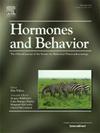Postnatal glucocorticoid exposure causes long-lasting effects on competitive but not neophobic behaviors in a common songbird
IF 2.5
3区 医学
Q2 BEHAVIORAL SCIENCES
引用次数: 0
Abstract
Postnatal stress can affect behavior and physiology in vertebrates, but long-term effects of early-life stress experience are not well understood, especially in wild species. Glucocorticoids, steroid hormones that mediate a suite of physiological and behavioral traits in response to a changing environment, might play an important role in programming long-term responses. We examined the effects of early-life exposure to corticosterone, the primary avian glucocorticoid, on neophobic and competitive behaviors in the house sparrow (Passer domesticus). We manipulated circulating corticosterone levels in wild, free-living nestlings, then measured behavior at the juvenile and adult stages in captivity. Birds were independently tested on their response to a novel object (i.e., neophobia) and tested in their nest group on their response to a limited food source (i.e., competitive behaviors). We had alternate predictions: (1) corticosterone-treated birds would exhibit fewer neophobic behaviors and more competitive behaviors than controls if early-life corticosterone exposure adaptively prepares animals for high-stress environments; or (2) corticosterone-treated birds would be more neophobic and less competitive compared to controls if high early-life corticosterone exposure outpaces the organism's capacity to regulate stability. Additionally, we predicted that postnatal corticosterone exposure might affect juvenile behavior more than adult behavior if responses can be modulated by individual experiences over time. We found that early-life corticosterone exposure largely did not predict neophobic behaviors in response to a novel object and environment but did predict competitive behaviors in juveniles. Corticosterone-treated juvenile males tended to be less competitive and displaced more frequently than control juvenile males, whereas corticosterone-treated juvenile females tended to be more competitive than control juvenile females; however, these patterns were no longer present by adulthood. We conclude that early-life stress might have sex-specific effects in a bird's competitive ability in their first year of life, which could impact survival in populations facing novel stressors.
出生后糖皮质激素暴露会对普通鸣禽的竞争行为产生长期影响,但不会对新恐惧症产生影响
出生后应激可以影响脊椎动物的行为和生理,但早期生活应激经历的长期影响尚不清楚,特别是在野生物种中。糖皮质激素是一种类固醇激素,可以调节一系列生理和行为特征,以应对不断变化的环境,它可能在规划长期反应中发挥重要作用。我们研究了早期暴露于皮质酮(主要的鸟类糖皮质激素)对家雀(Passer domesticus)新恐惧症和竞争行为的影响。我们控制了野生、自由生活的雏鸟的循环皮质酮水平,然后测量了圈养雏鸟和成年雏鸟的行为。研究人员独立测试了鸟类对新物体的反应(即,新事物恐惧症),并在鸟巢组测试了它们对有限食物来源的反应(即,竞争行为)。我们有不同的预测:(1)如果早期皮质酮暴露使动物适应高压力环境,那么与对照组相比,皮质酮治疗的鸟类会表现出更少的新恐惧行为和更多的竞争行为;或者(2)如果早期高皮质酮暴露超过了机体调节稳定性的能力,与对照组相比,皮质酮治疗的鸟类会更害怕新事物,竞争力更弱。此外,我们预测,如果反应可以通过个体经历随着时间的推移而调节,那么出生后皮质酮暴露对青少年行为的影响可能大于成人行为。我们发现,早期皮质酮暴露在很大程度上不能预测对新物体和环境的新恐惧行为,但可以预测青少年的竞争行为。与对照组相比,皮质酮治疗的雄性幼鱼竞争能力更弱,更容易移位,而雌性皮质酮治疗的雌性幼鱼竞争能力更强;然而,这些模式在成年后就不再存在了。我们得出结论,早期生活压力可能会对鸟类第一年的竞争能力产生性别特异性影响,这可能会影响面临新压力的种群的生存。
本文章由计算机程序翻译,如有差异,请以英文原文为准。
求助全文
约1分钟内获得全文
求助全文
来源期刊

Hormones and Behavior
医学-行为科学
CiteScore
6.70
自引率
8.60%
发文量
139
审稿时长
91 days
期刊介绍:
Hormones and Behavior publishes original research articles, reviews and special issues concerning hormone-brain-behavior relationships, broadly defined. The journal''s scope ranges from laboratory and field studies concerning neuroendocrine as well as endocrine mechanisms controlling the development or adult expression of behavior to studies concerning the environmental control and evolutionary significance of hormone-behavior relationships. The journal welcomes studies conducted on species ranging from invertebrates to mammals, including humans.
 求助内容:
求助内容: 应助结果提醒方式:
应助结果提醒方式:


